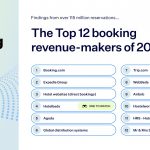We have made it through the most severe period the global hospitality industry has faced.
NB: This is an article from Atomize, one of our Expert Partners
Travel restrictions and lockdowns belong to the past and people are comfortable traveling again. But while recovery is in full swing in many markets, things aren’t going back to how they were. Things have changed because of the pandemic and we experience new travel trends and changing guest behavior.
Subscribe to our weekly newsletter and stay up to date
Guest booking behavior has shifted, and previously well-established travel patterns have been replaced by new, unfamiliar ones.
At first, this sounds like a massive new challenge but if you manage to monitor, predict and act on these changes, you can be ready to leverage these challenges and make the most of them at your hotel.
New guest behavior trends
Shifting seasonal trends
Many markets used to rely on seasons of high and low demand. But what was once predictable and expected is now much more variable.
Today, more guests are willing to travel during off-peak times. That includes periods before or after traditional high seasons and historically low-demand midweek days.
The Vrbo Trend Report 2022 reveals that the popular apartment rental platforms registered a 33% year-on-year increase in undated searches. This shows people have become more flexible with their trip’s timing. Marriott spokesperson Benjamin Gerow sees this at his group’s properties as well. During an earning call, he shared that shoulder days of Thursday and Sunday had already rebounded to just below 2019 levels.
This creates possibilities for your hotel to boost occupancy and revenue during traditionally slower periods. Be creative and offer value-packed deals or beneficial rates for shoulder days as well as pre- or post-season periods to attract today’s more flexible travelers.
Remote working and extended stays
The idea of remote work or bleisure travel isn’t new but the pandemic made it bloom. Expedia’s 2022 Travel Trends Report saw 56% of respondents saying they want to take a bleisure trip in the near future.
Vrbo’s 2022 trend report showed the same result, having found that 44% of families said they were more likely to work remotely in the future. The report also presented a 68% demand increase for 21- to 30-day stays. This shows that extended stays are likely to remain popular.
All this is good news for hotels with co-working facilities, services, and packages that cater to remote workers. Think about how your property could attract this new guest segment to take full advantage of this lasting trend.
Travelers want to do major trips
Now that long-distance travel is finally possible again, travelers are ready to splurge on the trip of a lifetime. For many, now is the time to make up for experiences and dreams they feel they missed out on during the pandemic.
A research by Accor, showed that 80% of UK residents want to travel in 2022 and are planning to spend 39% more on it than in 2019. It’s the same pattern in the United States. Data shows that 68% of Americans want to take a major trip to destinations in Europe and Asia this year. The situation is resembling in other major destination markets.
This gives you the chance to increase your ADR and drive more direct bookings with value-packed offers exclusive to your hotel website.
Growing demand for digitalization and personalization
As technology becomes a more natural part of people’s lives, this sets all kinds of customer expectations, which puts a certain pressure on hotels. For example, guests continue to demand a higher level of digitalization and quick replies regardless of which channel they use to request information.
Guests also look for a certain level of personalization before rating service as good. They want to feel unique and have a valuable experience. This can create a challenge for hotels as many are understaffed, and personalizing services demands an increased effort.
Read rest of the article at Atomize
The post Guest Booking Behaviour: How to Leverage Data to Adapt to New Trends appeared first on Revenue Hub.































